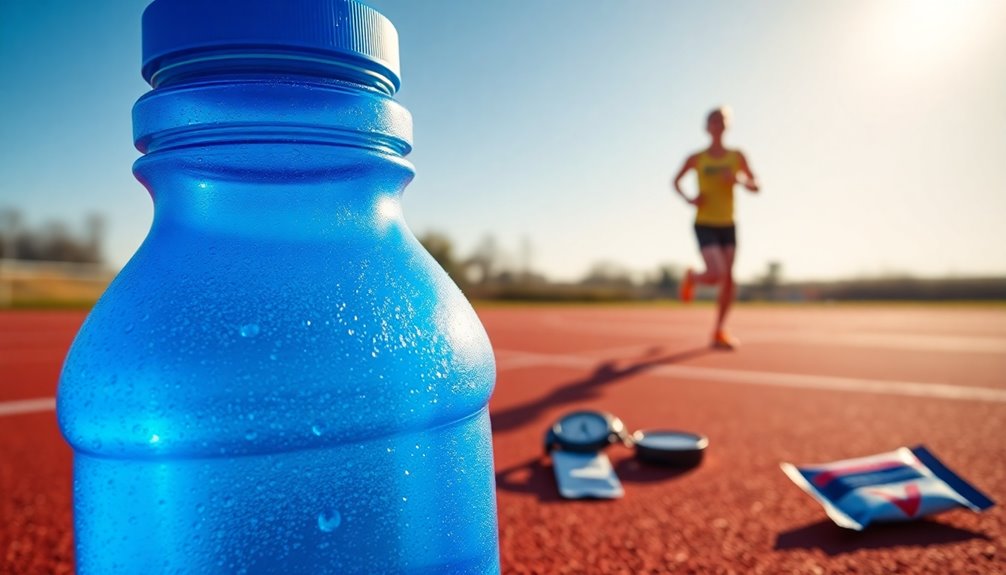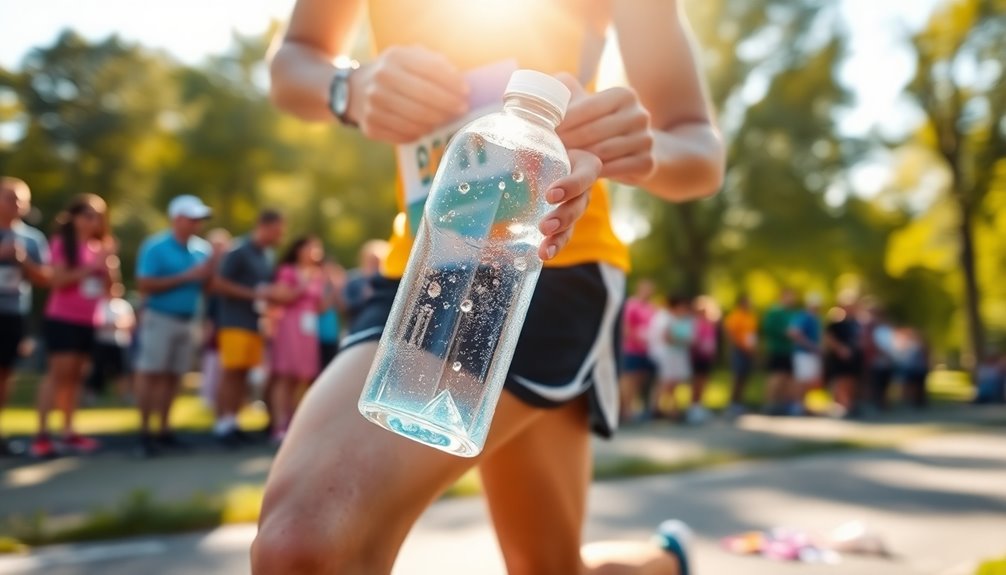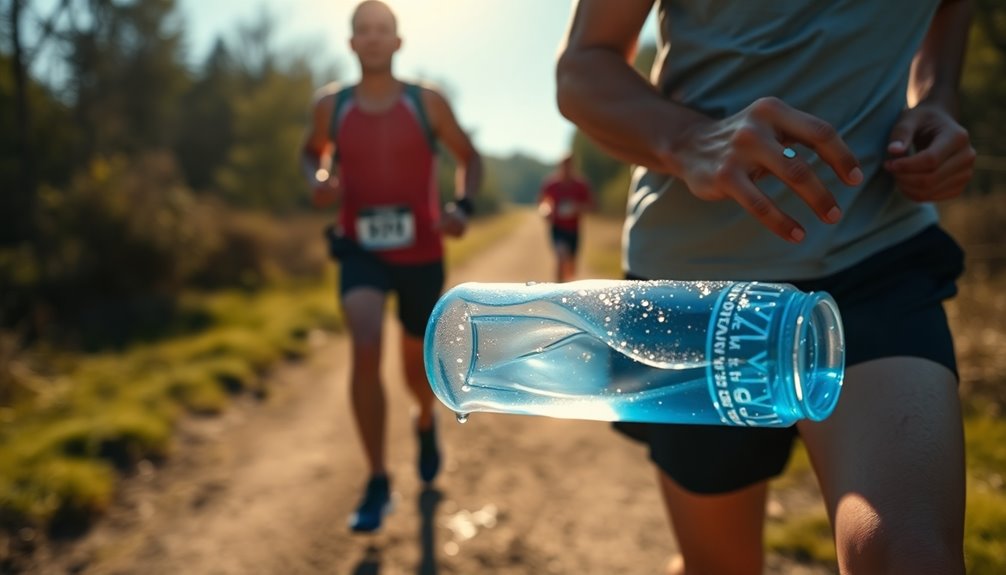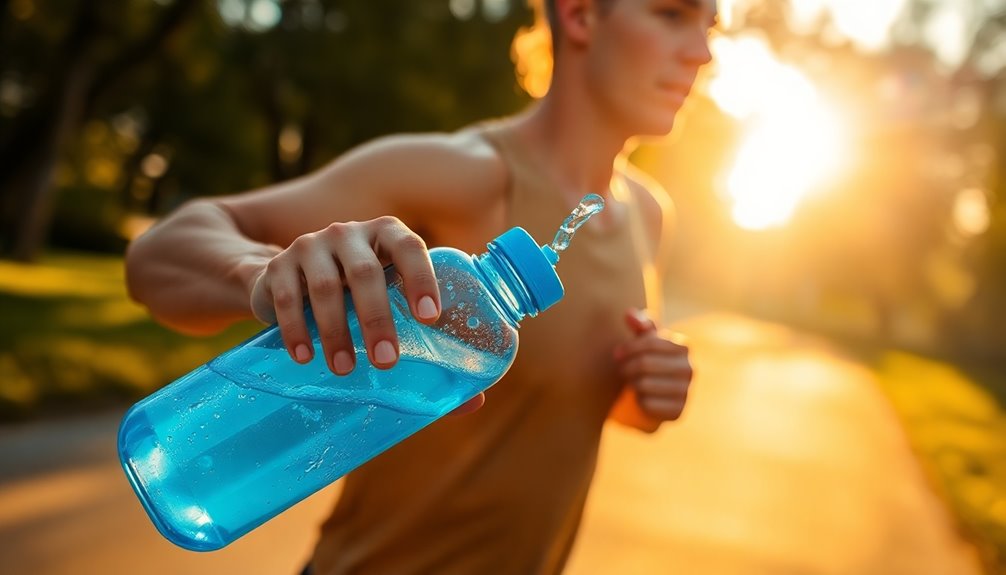Hydration's essential for your running performance. Just a 2% fluid loss can hurt endurance and strength. You should drink 6-16 ounces of water 1-2 hours before your run, followed by 250ml every 20 minutes during runs over an hour. After your run, rehydrate within the first hour, aiming to replace 16 to 24 ounces for every pound lost. Balance electrolytes, like sodium, to boost performance. Learn how to master hydration for ideal running benefits.
Key Takeaways
- Proper hydration enhances running performance by preventing a decline in endurance and effectiveness due to fluid loss.
- Maintaining optimal fluid balance helps regulate body temperature, reducing the risk of overheating during runs.
- Electrolytes, like sodium and potassium, are essential for muscle function and preventing cramps during extended activities.
- Dehydration symptoms, such as fatigue and confusion, can severely impact cognitive function and running efficiency.
- Regularly monitoring urine color can help gauge hydration levels and ensure adequate fluid intake before, during, and after runs.
The Importance of Hydration for Runners

When you hit the pavement, staying hydrated isn't just important—it's vital for your performance. Even a 2% fluid loss can compromise your ability to run effectively, increasing the risk of injury.
Understanding your sweat rate helps tailor your hydration strategy, as runners can lose anywhere from 400 to 2,400ml of fluid per hour. Monitor your urine color; pale straw yellow indicates proper hydration, while darker shades signal dehydration.
Don't forget to include electrolytes in your fluid intake, especially for long runs. Post-run rehydration is essential, aiming to replace 16 to 24 ounces of fluid for every pound lost during exercise.
Prioritize hydration to maintain peak performance and keep dehydration at bay.
Hydration Guidelines Before, During, and After Runs

To optimize your running performance, following specific hydration guidelines is essential before, during, and after your runs.
| Timeframe | Hydration Guidelines | Signs of Dehydration |
|---|---|---|
| Before a Run | 6-16 ounces of water 1-2 hours prior | Dark urine color |
| During a Run | For runs over an hour, drink 50ml every 20 minutes | Fatigue or dizziness |
| After a Run | Rehydrate within the first hour; replace 1.5x weight lost | Dry mouth or thirst |
| Daily Intake | 2.7L for women, 3.7L for men, including food | Concentrated urine color |
Understanding Electrolytes and Their Role in Performance

Understanding the role of electrolytes is essential for enhancing your running performance, especially during long runs where sweat loss can greatly impact your hydration and energy levels.
Electrolytes, like sodium, potassium, and magnesium, regulate nerve function and muscle contractions. When you sweat, you lose these crucial minerals, with sodium loss varying considerably.
To maintain electrolyte balance, it's recommended that heavy sweaters consume 300-600mg of sodium per hour during endurance events. Neglecting this can lead to muscle cramping, fatigue, and decreased coordination, all detrimental to your performance.
Incorporating electrolyte-rich fluids or foods during your runs will help replenish lost minerals, ensuring ideal hydration and supporting your overall performance on the track or trail. In addition to consuming electrolyte-rich fluids, it’s beneficial to focus on your diet before and after your workouts. By incorporating foods that are high in potassium and sodium, such as bananas or sports drinks, you can enhance your hydration strategy and aid in muscular recovery. Utilizing long run recovery techniques, such as stretching and foam rolling, can further promote blood circulation, helping your body to repair and prepare for your next workout.
Recognizing Dehydration Symptoms and Risks

How can you tell if you're becoming dehydrated during a run? Recognizing dehydration symptoms early is essential for maintaining your performance. Watch for dry mouth, dark yellow urine, muscle cramping, and fatigue. Even a fluid loss of just 2% of your body weight can affect your endurance and lead to overheating.
| Symptoms | Risks |
|---|---|
| Dry mouth | Impaired cognitive function |
| Dark yellow urine | Low blood pressure |
| Muscle cramping | Increased heart rate |
| Fatigue | Confusion and dizziness |
| Increased heart rate | Loss of coordination |
Monitoring your sweat rates and urine color can help assess your hydration levels. Don't ignore these signs; staying hydrated is critical for peak running performance.
Best Practices for Maintaining Hydration While Running

Recognizing the signs of dehydration is just the first step; maintaining proper hydration during your run is crucial for peak performance.
Start by drinking 6 to 16 ounces of water 1-2 hours before you hit the trail. During runs over an hour, aim for around 250ml (about 8 ounces) every 20 minutes to keep your fluid intake steady.
Pay attention to your thirst and body temperature; they can guide you in managing hydration. After your run, rehydrate within the first hour by replacing lost fluids—about 16 to 24 ounces for every pound lost.
Don't forget electrolytes; including at least 700mg of sodium per liter of fluid guarantees you maintain balance and support maximum performance.
Frequently Asked Questions
How Important Is Hydration for Running?
Hydration's incredibly important for your running.
Even a slight loss in body fluids can hurt your performance and increase injury risks. You can sweat out a lot of fluid during a run, so it's crucial to drink enough water before, during, and after.
Staying hydrated keeps your body temperature in check, maintains your energy levels, and helps prevent cramps.
Will Being Hydrated Make Me Run Faster?
Imagine you're running a 10K, and halfway through, you feel sluggish.
You've lost just 2% of your body weight in fluid. You won't just feel tired; your pace drops, and your focus wavers.
Staying hydrated can indeed help you run faster. When you're properly hydrated, your muscles function better, and you reduce the risk of cramps.
What Is the Role of Hydration in Performance?
Hydration plays an essential role in your performance, especially during physical activities.
When you're properly hydrated, you maintain ideal body temperature, endurance, and focus. Losing just a small percentage of body fluids can lead to fatigue and decreased coordination, making it hard to perform at your best.
Does Dehydration Affect Running Performance?
When your body experiences a bit of dry spell, it can really hinder your running performance.
Just a slight dip in hydration can make you feel tired and sluggish, impacting your stamina. You might notice an uptick in your heart rate and a decline in your focus.
Keeping your fluids up isn't just a suggestion; it's essential for maintaining peak performance.
Conclusion
In the grand marathon of life, hydration is your steady companion, like a well-worn pair of running shoes that supports every stride. By prioritizing fluid intake and understanding the balance of electrolytes, you guarantee your performance shines like the morning sun breaking through the horizon. Pay attention to your body's signals, and you'll navigate the course with confidence. Remember, staying hydrated isn't just about quenching thirst; it's about fueling your journey toward greatness.









